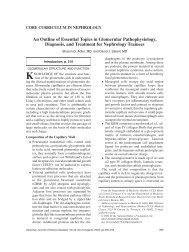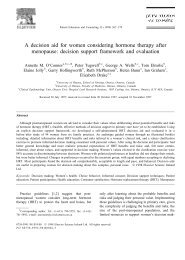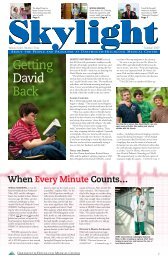Surgery and Healing in the Developing World - Dartmouth-Hitchcock
Surgery and Healing in the Developing World - Dartmouth-Hitchcock
Surgery and Healing in the Developing World - Dartmouth-Hitchcock
You also want an ePaper? Increase the reach of your titles
YUMPU automatically turns print PDFs into web optimized ePapers that Google loves.
<strong>World</strong> Health<br />
439<br />
challenge: name for me a s<strong>in</strong>gle disease for which improvements <strong>in</strong> diagnosis or<br />
treatment have reduced <strong>the</strong> <strong>in</strong>cidence of <strong>the</strong> disorder.<br />
A response, thought to be primitive, early on <strong>in</strong> <strong>the</strong> medical anthropology of<br />
struggle with disease <strong>in</strong>vasion is “Why?” Why me? Who has s<strong>in</strong>ned, that this visitation<br />
should have fallen upon us? Who has <strong>in</strong>flicted this evil upon us? With enough<br />
resources <strong>in</strong>vested <strong>in</strong> <strong>the</strong> micro-analysis of <strong>the</strong> process, a taxonomy evolves to answer<br />
<strong>the</strong> questions of “How?” “What have we done wrong?” k<strong>in</strong>ds of questions are<br />
typically replaced with “How might this disorder be prevented?” as fur<strong>the</strong>r <strong>in</strong>formation<br />
is accrued <strong>and</strong> manipulated. This “<strong>in</strong>formation science” has led to control of<br />
some diseases, but eradication of few, <strong>and</strong> before we might take <strong>the</strong> next step toward<br />
mastery of health, <strong>the</strong> more mature question “why?” reemerges. One of <strong>the</strong> most<br />
renowned found<strong>in</strong>g fa<strong>the</strong>rs of reductionist anatomic pathology, Rudolph Virchow,<br />
had this surpris<strong>in</strong>g <strong>in</strong>sight: “Whenever mass disease occurs, it is a result of ‘disturbance<br />
of human culture.’”<br />
To enter this meta-analysis <strong>in</strong>to causation of disease may seem to some to be<br />
outside <strong>the</strong> limits of <strong>the</strong> license to practice issued to Virchow <strong>the</strong> pathologist, Geelhoed<br />
<strong>the</strong> surgeon, or you <strong>the</strong> reader, among all of us shar<strong>in</strong>g <strong>the</strong> morbidity <strong>and</strong> mortality<br />
that makes us human...<strong>and</strong> potential consumers of medic<strong>in</strong>e’s resources. But it may<br />
give us some <strong>in</strong>sight to address <strong>the</strong> paradox of modern medic<strong>in</strong>e at <strong>the</strong> millennium:<br />
never have we been able to do so much for such complex <strong>and</strong> serious diseases so<br />
effectively, us<strong>in</strong>g such sophisticated <strong>and</strong> costly technology <strong>and</strong> manpower resources<br />
to manipulate this <strong>in</strong>formation, for a privileged population <strong>in</strong> this country which<br />
has never been less satisfied with health services. And <strong>the</strong>se <strong>in</strong>adequate, even if redundant,<br />
services apply only to <strong>the</strong> over-cared-for first-world population, which<br />
lives contemporaneously with many more global citizens who cannot enjoy even so<br />
much as a fraction of a percentage of <strong>the</strong> care that is wasted on <strong>the</strong> o<strong>the</strong>r side of <strong>the</strong><br />
north/south border. As <strong>the</strong> stentorian tone of <strong>the</strong> disembodied voice warns us as we<br />
approach <strong>the</strong> station <strong>in</strong> <strong>the</strong> London tube: “M<strong>in</strong>d <strong>the</strong> Gap!”<br />
How can we advocate “world health” for a global population when <strong>the</strong>re are such<br />
gaps <strong>in</strong> socioeconomic <strong>and</strong> cultural milieu <strong>in</strong> which <strong>the</strong> same medic<strong>in</strong>e is to be<br />
practiced?<br />
I may use an example from my own experience relat<strong>in</strong>g to <strong>the</strong> large part of <strong>the</strong><br />
global population which is hypothyroid, for reasons of iod<strong>in</strong>e deficiency or its impaired<br />
utilization, <strong>and</strong> which, presumably, might be readily treated by replac<strong>in</strong>g <strong>the</strong><br />
simple, ubiquitous, cheap micronutrient iod<strong>in</strong>e. “This much we know, <strong>and</strong> this we<br />
can do, so let us achieve universal coverage <strong>in</strong> this vertical health care program, with<br />
a target date of <strong>the</strong> millennium” declared <strong>the</strong> <strong>World</strong> Health Assembly of 1990. This<br />
is a classic medical model of “one ill, one pill, one bill” with simplicity as its largest<br />
appeal. Just how difficult can that be? The target date was not achieved, <strong>and</strong> <strong>the</strong><br />
problem, far from eradicated, may have grown larger <strong>in</strong> <strong>the</strong> <strong>in</strong>terval—as quite typically<br />
occurs <strong>in</strong> vertical health care programs that appeal for programmatic funds.<br />
I conducted such a program of iod<strong>in</strong>e repletion <strong>in</strong> a profoundly iod<strong>in</strong>e deficient<br />
population <strong>in</strong> Central Africa, <strong>and</strong> stayed on—some might say, too long— to observe<br />
<strong>the</strong> results. The iod<strong>in</strong>e repletion works: cret<strong>in</strong>ism was elim<strong>in</strong>ated <strong>and</strong> giant<br />
goiters shrank, <strong>and</strong> those that were troublesome for airway management were operated<br />
for demonstrable relief. This could be a model of success <strong>in</strong> vertical health care<br />
programs, achiev<strong>in</strong>g real <strong>and</strong> measurable results nearly immediately.<br />
But I stayed on to ask <strong>the</strong> fur<strong>the</strong>r consequences of success or failure <strong>in</strong> <strong>the</strong> more<br />
difficult terms of humanitarian benefit, beyond <strong>the</strong> morphologic <strong>and</strong> functional<br />
43










